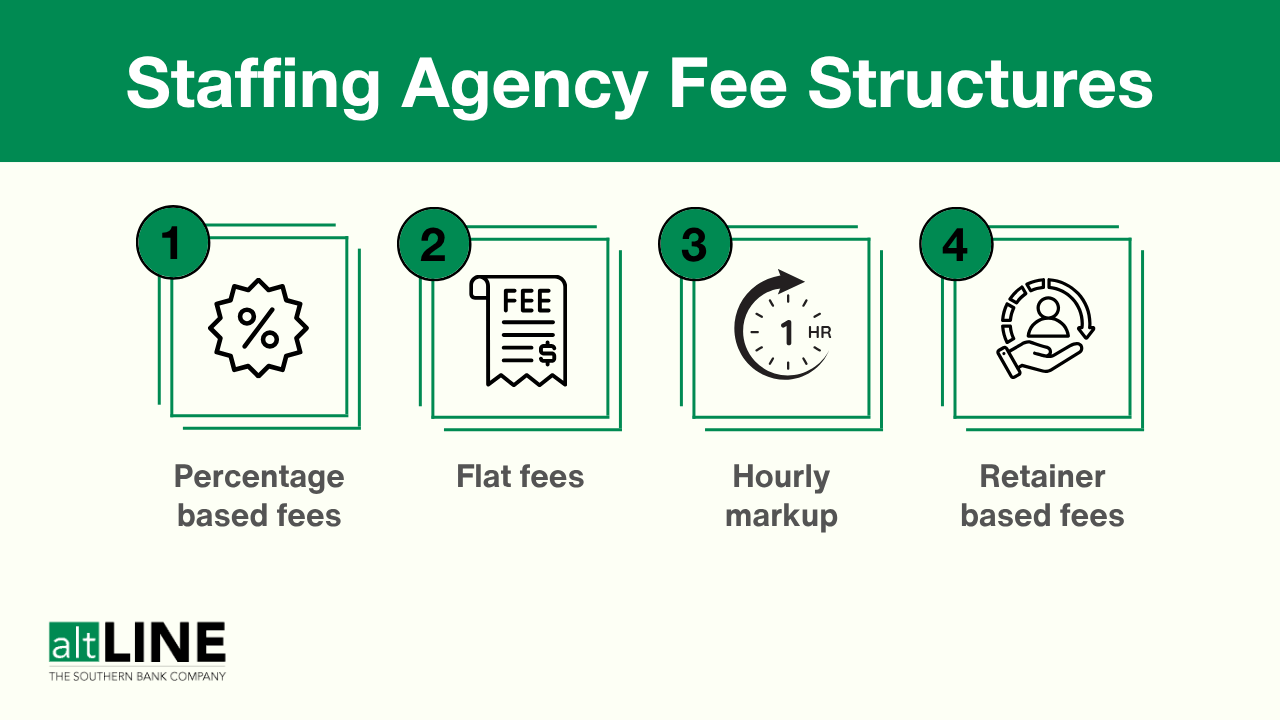Last Updated June 3, 2025
A staffing agency’s pricing model directly affects its profitability, whether a staffing agency is placing temp workers, offering direct hire services, or building long-term client partnerships, your pricing model directly affects profitability.
But selling your staffing services can feel anything but simple, especially since there are various pricing models and fee standards. How do you know if you’re over- or under-charging? From staffing agency conversion fees to flat fee staffing agency models and hourly markups, there’s no one-size-fits-all approach.
In this guide, we’ll break down how staffing agency fee structures work, explain factors that influence pricing, and answer critical questions like “How much do staffing agencies charge employers?” While pricing can be challenging, understanding these factors will help you follow a transparent and competitive pricing strategy that keeps you profitable.
How Do Staffing Agency Fees Work?
All staffing agencies charge a fee for their services. In most cases, staffing agencies work by charging clients (employers) a fee in exchange for sourcing, screening, and placing qualified candidates. These fees can vary widely based on the staffing agency fee structure you choose, the type of placement, and the level of service provided. As the agency owner, you’re responsible for defining your pricing model, communicating it clearly, and ensuring it keeps your business profitable.
Clients almost always cover the cost of your services. So if you’re asked, “Do staffing agencies charge a fee to candidates?” the answer is generally no. In most countries, it’s standard for the employer to pay, not the new hire.
Still, there are lots of ways to charge employers for your expertise. It depends largely on your industry and the types of roles you hire for. Whether you’re filling temporary roles, searching for top-tier executive talent, or hiring specialized professionals like nurses, understanding the staffing agency fee structure is crucial for budgeting. Ultimately, your pricing should reflect the value of your recruitment expertise and the quality of your matches—all while meeting the client’s expectations and budget.
Understanding Staffing Agency Fee Structures
There’s no one-size-fits-all pricing structure for agencies. What works for another business might not be right for another, so it’s a staffing agency best practice to choose a fee structure that works best for your approach to hiring. These are the four most common staffing agency fee structures.

Percentage-Based Fees
Percentage-based fees are one of the most common ways staffing agencies make money. With this approach, the client pays a percentage of the new hire’s first-year salary. The exact percentage differs based on a lot of factors, but 15% to 25% is standard in most cases.
However, you might be able to justify a higher percentage if you hire for specialty or high-level executive roles. Be sure to include the terms in your staffing agency fee agreement and clarify if staffing agency conversion fees apply if the client hires a temp into a full-time role.
Flat Fees
With a flat fee staffing agency fee structure, you charge a set amount per placement. This approach works great if you’re hiring a lot of candidates in bulk (usually for entry-level positions) or working for a cost-conscious client. The predictability is also a bonus for your bottom line.
However, flat fees can quickly eat into your margins, especially if you encounter unexpected expenses. If you’re exploring this model, consider your costs, time, investment, and the complexity of the roles you’re hiring for. It’s best to follow a flat fee structure after you have more experience under your belt and better understand the costs and effort required to hire quality candidates.
Hourly Markup
An hourly markup model is popular for agencies that offer temporary or contract staffing. With this approach, your agency pays the worker a base rate and then charges the client at a higher rate. That markup covers your temp agency staffing fees and operational costs. For example, if you pay a worker $20/hour and charge the client $30/hour, the markup is $10/hour. This model doesn’t work for every staffing agency, but it’s a good approach if you specialize in contract, temporary, or project-based work.
Retainer-Based
With a retainer arrangement, a client usually works with you for hiring multiple types of roles. With this arrangement, you function as an external HR department of sorts, helping the client hire internal employees. The upside to retainer arrangements is that you receive a set payment every month your contract is active. However, you’re still expected to get results, and may need to offer value-added services, like background checks, to justify your retainer.
How Much Do Staffing Agencies Charge?
While picking a staffing agency pricing structure is essential, you also need to know the standard rates for your industry, area, and the types of roles you fill. Staffing agency markup rates will keep you profitable, but charging too much will drive clients away and make it tough to retain business.
Most percentage-based fees charge 15% to 25% of a candidate’s first-year salary. For specialized or executive roles, this can go as high as 30%. So if you’re wondering how much staffing agencies charge for direct hire, a $100,000 salary could mean a $20,000 fee.
Hourly markups can range from 30% to 70%, depending on the role and industry. Flat fee models charge anywhere from $1,000 to $7,500 per placement, depending on the complexity of the role and any bulk pricing negotiations. For high-level or hard-to-fill roles, retainer-based agencies may charge 25% to 35% of the projected salary, broken into multiple installments. Clients pay part of the fee upfront, another portion during the search, and the remainder upon placement.
Another thing to consider is staffing agency conversion fees. If a client decides to hire your worker full-time, this one-time fee compensates your agency for sourcing and training them.
Similarly, staffing agency buyout fees protect your revenue if a client wants to bypass the contract and bring a worker in-house. Always consider these situations in your staffing agency contracts to protect profitability.
What Factors Determine Staffing Agency Fees?
Your staffing agency fee structure is a great starting point, but even then, how much should you charge? Several variables influence how much you should charge:
- Industry: Some industries can justify bigger staffing fees because they’re more specialized or harder to fill. For example, nursing staffing agencies can usually charge more than a generic agency.
- Role complexity: Executive-level placements typically command higher staffing agency fees than entry-level roles. The more specialized or strategic the position, the more time and effort it takes to fill, justifying a higher staffing agency rate.
- Location: Staffing agency fees differ by location because of the varying cost of living.
- Timeline: You can justify charging a higher rate if clients have a tight timeline and need you to work quickly.
- Negotiation: Some staffing agencies negotiate rates with clients. For example, you might be able to cut a client a deal on flat fee pricing in exchange for more roles to fill. Ultimately, these negotiations will affect your bottom line.
- Additional services: Value-added services are a great way to retain clients while increasing your billable rate. For example, if you can offer training, background checks, or onboarding help, you might be able to justify a higher fee.
In-Summary: How Much Do Staffing Agencies Charge?
If you’re building or growing a staffing agency, having a clear grasp on how much staffing agencies charge can help you position your services, communicate value, and set competitive pricing. However, staffing agency fees vary widely. Your staffing agency fee structure should reflect the roles you hire for, your industry specialization, and any value-added services you offer.
Be as transparent as possible with your clients about your staffing agency fee structure. Explain everything in a contract and require the client to sign it before doing any work. A staffing agency fee agreement will help you manage client expectations and protect your agency during the recruitment process.

Staffing Agency Fees FAQs
Do staffing agencies charge a fee?
Yes. All staffing agencies charge fees to employers in exchange for finding candidates for their job listings. Whether it’s a temp agency staffing fee, a flat fee, or a percentage-based direct hire fee, it’s important to clearly outline your pricing in a staffing agency fee agreement.
How much do nurse staffing agencies charge?
It depends on the location, specialization, and hiring timeline. Most agencies charge more for nursing roles because they have to check the candidates’ licensing and credentials. It’s not unusual to see percentage-based staffing agency fees between 20% to 30% for nurses because they’re in such high demand.
How much do staffing agencies charge employers?
It depends on a lot of factors. For direct hires, fees typically range from 15% to 25% of the candidate’s first-year salary. For temporary roles, agencies apply hourly markups—often between 30% to 70%—on the employee’s base rate.
How much do staffing agencies charge for direct hire?
Most agencies charge for permanent placements on a percentage-based model. Most agreements charge between 15% to 25% of the new hire’s annual salary, though this can increase for executive or highly specialized roles.
How do you find out staffing agency fees?
Finding out staffing agency fees requires a bit of research. Look at competitor pricing, talk to industry peers, and benchmark pricing based on your niche. You can also explore public case studies or client-facing agency websites.
Michael McCareins is the Content Marketing Associate at altLINE, where he is dedicated to creating and managing optimal content for readers. Following a brief career in media relations, Michael has discovered a passion for content marketing through developing unique, informative content to help audiences better understand ideas and topics such as invoice factoring and A/R financing.









